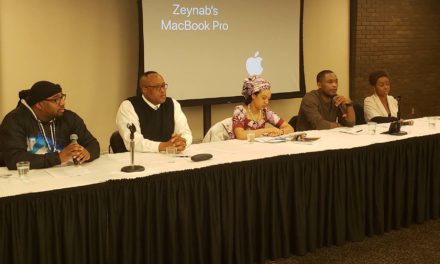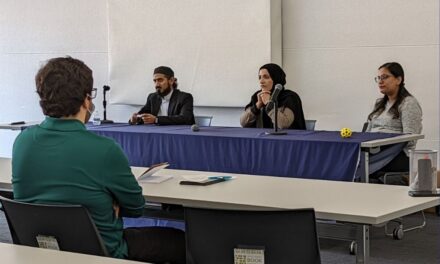
“The reasons given for not changing the gelatins, in the name of ‘tradition,’ exclude Muslim, Buddhist, Hindu, Jewish, Vegetarian, and Vegan students from partaking in eating the official, campus wide, traditional ice cream that is often listed as part of the ‘Wisconsin experience,'” – Statement from proposed legislation titled “Ice Cream for All”
When Yogev Ben-Yitscak, a Jewish student and Vice chair of the UW-Madison student group, Associated Students of Madison (ASM) brought up to the rest of the members of ASM the idea that university-owned Babcock Dairy was excluding many from the experience of eating their ice cream, the students thought he had lost it. Some students were angry and said there are more important issues to address.
However after an intense debate regarding the animal gelatin used in the ice cream, the ASM decided that since the student members were voted in by their peers to represent the concerns of all students on campus, it was their responsibility to craft legislation that demands the ice cream produced and served at the university-owned Babcock Dairy use more “inclusive” ingredients, cease the “marginalization” of “Muslim, Buddhist, Hindu, Jewish, Vegetarian, and Vegan students.”
The issue has gone viral on social media, with overwhelming criticism of ASM. Some of the right wing media and bloggers, many out of state, have taken to blame the Muslims regarding this decision. Babcock Dairy already serves Lactose Free and non-gelatin ice cream options. ASM members feel that those choices are less popular. Strawberry, for example, is a flavor that has gelatin in it and one member asked “should I be deprived of strawberry ice cream from Babcock Dairy?” Some would argue that access to any commercial product is not a constitutional right.
Considering that people of color have been direct targets of racial threats at Madison for simply existing as people of color, protesting the “inclusiveness” of ice cream ingredients is seen by some as the definition of white privilege in Wisconsin society and an insult to those who have sacrificed so much to the cause of social justice. While others believe that since Babcock Dairy is part of the University, it is the responsibility of the University to not exclude anyone, even in such a minor issue.
“I think the issue is a pretty simple one, Babcock Ice Cream doesn’t want to change their recipe for the sake of keeping “tradition.” Had this been a private company I would understand, but since it is directly integrated within the University and plays such a big role in the Wisconsin Experience, we can’t stand for keeping traditions if those traditions exclude so many different marginalized communities that the university tries to include. Beef Gelatin means Jews, Muslims, Hindus, and Vegetarians cannot join in on the tradition, and having a few options without beef gelatin when Babcock could easily get rid of the beef in all of their ice cream shows us where their, and the university’s, priorities lay.”
– Yogev Ben-Yitscak, Vice chair of Associated Students of Madison
Considering the number of financially challenged college students who struggle to pay tuition, the social division and marginalization that exists in society, and the under representation of many races at UW-Madison, the “Wisconsin Experience” of eating or not eating a particular ice cream is most probably a non-issue to many Jews, Muslims, Hindus and Vegetarians.
Regardless who owns Babcock Dairy, it is a business and there are some things that the market decides. For those who remember 8-track tapes, they were the pinnacle of the music experience in the 1970s. They were displaced by CDs in the 1980s, iPods in the 2000s, and now streaming music services today. The same families who stream movies from iTunes also have a closet full of VCR tapes gathering dust. Music and movies are not associated with religious beliefs that directly marginalize people. But they are not inclusive, due to the lack of entertainment choices available to people of color or their religious affiliation. However, there are some that believe a public university must be held to a different standard.
There are many things that should be legislated, like equality for marginalized people. The issue of animal gelatin is not considered a detrimental issue. If ice cream was vital to the experience of equality, the mandatory eating of ice cream by all citizens should be legislated.
The Wisconsin Muslim Journal interviewed representatives from Babcock Dairy and the student organization. Since other news organizations are covering the issue and it is gaining attention, here is a Q&A from both sides, presented in their own words.
Q&A with Bill Klein, Babcock Dairy Plant Manager
Q: What is gelatin and how is it used in your ice cream?
A: Gelatin is a beef co-product that functions as a stabilizer in Babcock ice cream. It helps to thicken Babcock ice cream and to prevent it from getting icy over time. Gelatin is also a key component in the unique sensory character of Babcock ice cream, influencing the product’s texture, flavor perception and melting performance.
Q: How does Babcock Hall Dairy Store respond to the proposed legislation taken by Associated Students of Madison against gelatin in its ice cream?
A: One of the benefits of being part of a university is the opportunity for conversations on a wide range of subjects – including ice cream production. We value to the opportunity to be able to teach more people about what we do.
Q: How does Babcock Hall Dairy Store respond to student concerns that having beef gelatin in Babcock ice cream is excluding marginalized communities? (For example, Muslims, Jews, Hindus and vegetarians)
A: We understand that people have a number of reasons to not eat Babcock products ranging from values and beliefs to health and allergy concerns and taste preferences. Although our primary purpose is teaching and research, we are constantly trying to develop new products to meet the needs of different types of customers. We make premium ice creams, sherbets and Greek frozen yogurts that are gelatin-free and vegetarian. We make a flavor that is lactose-free, gelatin-free and vegetarian. Most importantly, we label our ingredients, including gelatin when it is present, so that customers can make informed decisions.
Q: How does Babcock ice cream play a role in the Wisconsin Experience?
A: We believe the most significant contribution we make to the Wisconsin Experience for UW-Madison students is the opportunity to learn about the dairy industry and dairy product manufacturing in the Babcock Hall Dairy Plant and in the Dairy Store. Food science majors and other students can learn production and conduct research in a working dairy plant, which we know better prepares them for careers after graduation. The fact that many students also enjoy eating the products developed and manufactured in our small-scale plant is just an additional benefit.
Q: How will the recent $47 million project launched of the Babcock Hall Dairy Store Plant and Center of Dairy Research affect the diverse staff and students at UW-Madison?
A: The renovations to the Babcock Hall Dairy Plant will allow us to bring the Dairy Plant to 2018 manufacturing standards, giving students, staff and researchers access to the latest technologies. The CDR addition will give the Center additional space for researchers to develop new dairy-based foods, including specialty cheeses and fermented dairy products, increasing the CDR’s capacity to develop dairy products that meet the needs of diverse consumers.
Q&A with Yogev Ben-Yitscak, Vice chair of Associated Students of Madison
Q: Babcock Hall Dairy Store ice cream is singled out as the main focus of anti-gelatin legislation, why not other ice cream companies and food manufacturers who use gelatin in their products?
A: We specifically targeted Babcock since Babcock is made by the University itself (under the CALS program). ASM has a very specific scope when it comes to issues affecting students, and we want to focus on issues we know we can have an influence on. This is mainly university-related issues, including university made ice cream. Also, Babcock is the unofficial ice cream of the university, in every dining hall and both unions and served in most events, and so this ice cream really plays a big role in students’ lives.
Q: There is no legislation for many health and religious preferences regarding food preparation, so why do you think this push for legislation at a university level can succeed?
A: Two years ago, due to ASM activism, Babcock changed its recipe from Pork to Beef gelatin. From the connections ASM has to how much work and meetings a lot of the representatives are doing, we have a good sizeable chunk of support that hopefully makes Babcock reconsider its formula.
Q: How will this legislation impact the experiences of the community members it’s affecting?
A: I think it’ll make marginalized students, who already don’t feel included on Campus, feel more welcome in Madison. Babcock plays such a vital role in the Wisconsin Experience, and almost every student talks about Babcock and sees Babcock every day. By allowing Jewish, Muslim, Hindu, and Vegetarian students to partake in the tradition of Babcock, maybe they’ll feel slightly more part of our university, and we definitely want that.














